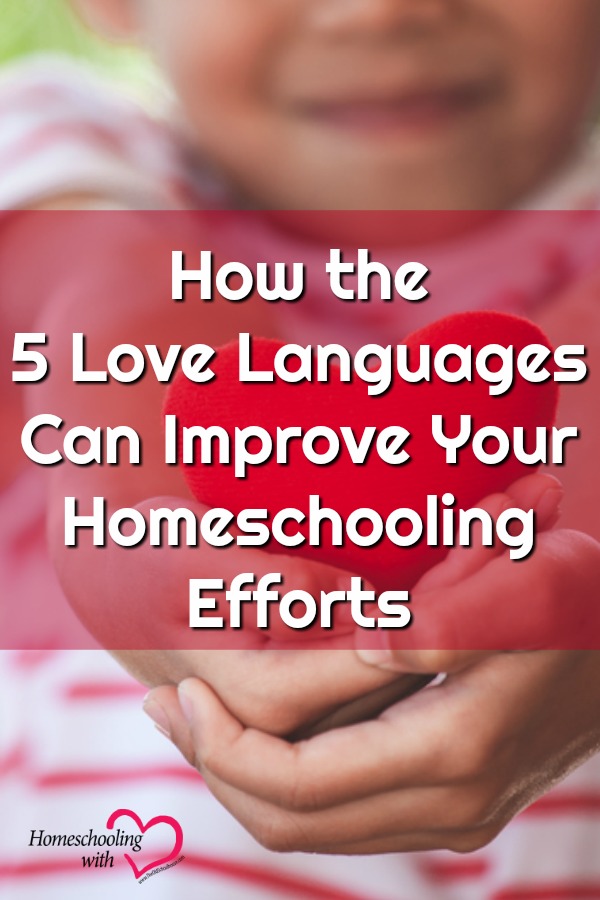How the 5 Love Languages Can Improve Your Homeschooling Efforts


When my oldest son and I walked into the American Science & Surplus store, he immediately found the kits section. He held up the trebuchet kit and frowned.
“You said two years ago that you would buy this for me and you never did.”
I stood there, flabbergasted. He had only mentioned it one time. One time! I completely forgot about it and thought he had, too. When we studied medieval times, we had gone to the stained-glass museum at Navy Pier and made tissue paper replicas. We also went to the Lithuanian Museum and the Art Institute of Chicago because of their knight exhibits. He and his little brother played with the toy castle and knights. They had watched movies and read books. I didn’t think it mattered.
Understanding your child’s love language matters
Well, it DID matter. It mattered to him because one of his love languages is gifts. In his mind, I didn’t love him enough to get him the kit that meant so much to him. His younger sister has the same love language. And the same memory! My daughter cries and quickly points out perceived unfairness when another sibling receives something and she doesn’t. (Nevermind the fact that I may hug her more or offer her specific encouragement). My little boy could care less if you buy him stuff. Packages sit unopened for weeks. He just wants you to make cookies for him.
What are the five love languages?
The five love languages are: gifts, service, affection, words of affirmation, and time. These were first documented in a 1995 book by Gary Chapman titled The Five Love Languages: How to Express Heartfelt Commitment to Your Mate. He has since published several versions, including one about kids. The idea is that each person feels love differently. Some people feel loved when they receive thoughtful, personal gifts. Others feel loved when cuddled and held. Still others know that you love them when you clean their room. You get the idea.
Our kids are the same way. Sofia, my oldest, feels loved through quality time and affection. My oldest son’s love languages are gifts and words of affirmation. My younger daughter understands love through gifts and quality time. And, my little boy feels love through service and time.
How this knowledge can improve your homeschooling efforts
Knowing your child’s love language(s) can provide important clues as to what is important to him, what motivates him, and where you have unintentionally hurt him. However, we do need to be careful with this knowledge and not misuse it to manipulate our children. Withholding our expression of love in order to force obedience is the worst kind of manipulation. It makes us hypocrites, too. Jesus loves us unconditionally and we are ambassadors of his love. Therefore, we need to extend the same agape love to our children.
More specifically, knowing your child’s love language(s) can:

Improve your relationship
When a child feels valued and loved, he is more likely to cooperate and communicate with you. If your relationship has been strained or full of friction, this is where the healing process begins.
Ignite intrinsic motivation
A child who knows that you love him unconditionally is more likely to want to learn. And, he feels safe expressing his interests to you.
Offer insight
If a child’s love language is gifts, perhaps he is also a hands-on learner. If a child’s love language is time, maybe he also prefers that you sit with him while he does his schoolwork. Maybe, through learning about love languages, you learn that your child learns better through audiobooks (his love language is words of affirmation). It is not a one-to-one correlation, but it can give you some new information that perhaps you haven’t considered.
Closing thoughts
Learning about love languages improved my relationships with my four children and helped me understand them better. I did buy my older son that trebuchet kit and became more intentional about listening to his requests. As my older daughter grew, we had a standing coffee date on Fridays to discuss her schoolwork, social life, and whatever else came up. I bought all the books my younger daughter requested. Every Monday night, I made tea and cookies for my little boy and we read stories. The five love languages not only impacted my homeschool, they transformed my family. They brought about some rich traditions and memories that will live with me always.
Julie Polanco is a veteran homeschooling mom of 16+ years and the author of God Schooling: How God Intended Children to Learn and 100 Ways to Motivate Kids.Readers can receive 30% off Julie’s course for parents, How to Motivate Your Child to Learn without Bribes or Punishments, with the coupon code MOTIVATE30. Click HERE to check it out! Use by March 30, 2019.











































